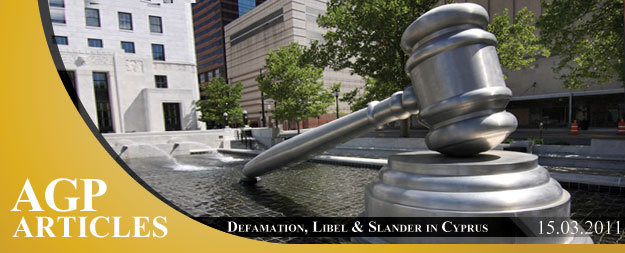
Defamation under Cyprus law may be a criminal or civil charge filed by a private lawyer.
Our law firm represents both, claimants and defendants, in defamation, libel and slander proceedings in Cyprus. There are certain requirements for a defamation, libel or slander action in Cyprus in order to succeed. It encompasses both written statements, known as libel, and spoken statements, called slander. It can also be a gesture, which is also a type of slander. Any intentional false communication that harms a person’s reputation, manipulate public opinions or feelings against a person may well constitutes “defamation of character” under Cyprus law.
The Courts in Cyprus when considering defamation, libel or slander actions usually balance the plaintiff’s interest in preserving his reputation against the public’s interest in freedom of expression especially in the area of political debate.
The probability that a plaintiff will recover damages in a defamation suit in Cyprus depends largely on whether the plaintiff is a public or private figure in the eyes of the law. However distinguishing between public and private figures for the purposes of defamation law is sometimes difficult.
The law in Cyprus and generally treats slander differently than libel: with slander, you have to prove you suffered damages, in the form of financial loss, in order to get compensation. But with libel, the law presumes you suffered damages.
Additionally there are instances where defamation is proven per se hence there is no need to prove damages suffered; such as allegations for adultery or attacks and negative remarks on a person’s professional character or standing.
On the other hand there is a number of defenses available for defamation such as where what has been published was simply the “truth”, or where no matter how false or outrageous statements, such statements were “privileged”.
Although defamation actions are rooted in common law, Cyprus, like most jurisdictions have enacted the Civil Wrongs Law, Cap. 148 which modifies the common law.
In some instances there may even be a requirement that the defendant be given an opportunity to apologize before the plaintiff can seek non-economic damages. For example, a newspaper or a TV or radio station that publishes or broadcasts a libel can limit the amount of the damages they may have to pay by publishing or broadcasting an apology right away.














